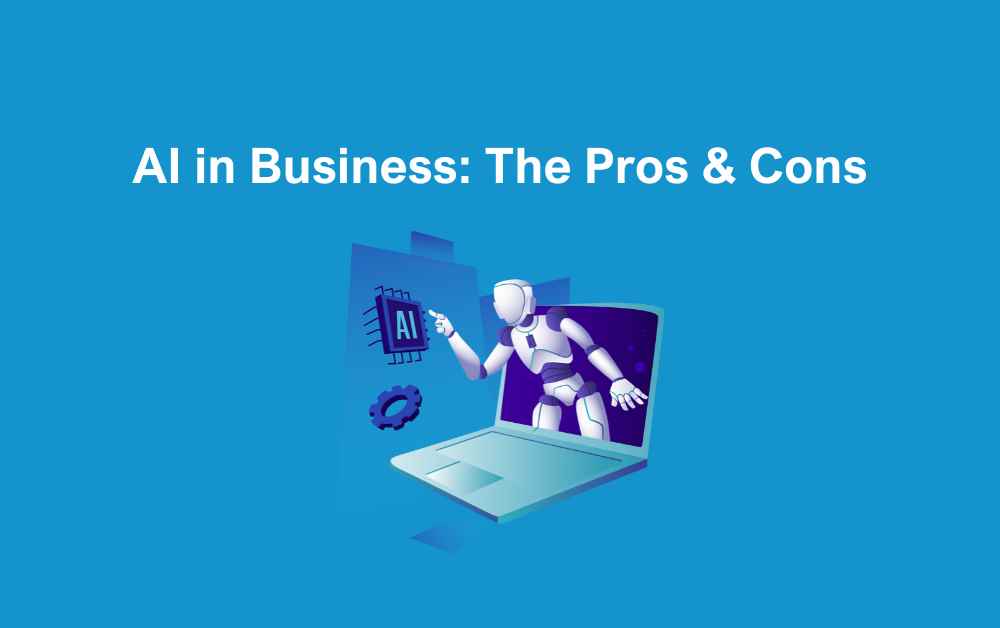AI in business has quickly moved from a futuristic idea to a practical tool that many businesses are already using – and it looks like it’s here to stay. While its rapid rise has left some feeling cautious, the general advice from experts and policymakers at events like the CIPD conference is clear: businesses should be making the most of it. AI can help automate tasks, analyse data, and offer smart insights, bringing clear benefits to the workplace – but like any new technology, it also comes with its own set of challenges. In this blog, we’ll explore both the positives and the potential pitfalls of using AI in business.
Jump to a Section:
What is AI?
AI, or Artificial Intelligence, is a fancy term for technology that can think and learn a bit like humans do. It helps computers and machines do things like understand speech, spot patterns, make decisions, and even improve over time without being told what to do at every step.
In a business setting, that means AI can take over repetitive tasks, help you understand your data better, and make smarter, faster decisions. Think of AI in business as an extra pair of hands (or a very clever assistant) that works in the background – analysing customer trends, predicting what might happen next, or automating time-consuming admin jobs.
It’s already being used across all kinds of businesses – from chatbots that handle customer questions, to tools that help with recruitment, marketing, and forecasting.
Pros of Artificial Intelligence in the Workplace
Increased Efficiency and Productivity:
AI-powered automation streamlines repetitive tasks, enabling employees to focus on more complex and creative endeavours. By handling mundane activities like data entry, scheduling, and basic customer queries, AI in business frees up valuable time and boosts overall productivity.
Enhanced Decision-Making:
Artificial intelligence algorithms can analyse vast amounts of data, identify patterns, and generate actionable insights. This empowers businesses to make more informed decisions, optimise processes, and develop effective strategies. AI’s ability to process and interpret data at a scale unattainable by humans is invaluable for businesses across sectors.
Improved Customer Experience:
AI in business means AI-powered chatbots and virtual assistants, providing real-time support and personalised interactions with customers. They can answer queries, offer recommendations, and provide assistance 24/7. By delivering prompt and accurate responses, it enhances the customer experience, leading to increased satisfaction and loyalty.
Mitigation of Human Error:
Humans are prone to errors, especially when dealing with repetitive tasks or vast amounts of data. AI systems minimise human error by consistently applying predetermined rules and algorithms. This improves accuracy and reliability, reducing the risk of costly mistakes in critical operations.
Cons of Artificial Intelligence in the Workplace
Job Displacement and Workforce Challenges
As AI automates routine tasks, there is a concern that certain job roles may become obsolete, leading to unemployment and economic disruption. Organisations must carefully plan the integration of AI technologies to minimise workforce displacement. Additionally, the need for upskilling and reskilling employees to adapt to AI-driven changes poses challenges for both individuals and businesses.
Ethical Considerations
AI in business raises ethical questions regarding data privacy, bias, and transparency. Algorithms can inadvertently perpetuate societal biases present in training data, leading to discrimination or unfair outcomes. Organisations must proactively address these concerns, ensure transparency in AI systems, and establish ethical guidelines to prevent misuse or unintended consequences.
Accuracy
Although this has developed in a rapid pace, it still has a way to go to offer up to date and accurate information. Tools such as ChatGPT base its decisions on the past. In addition, it can be argued that it lacks creativity and up to date information. Some people have shared that when using AI in business, it seems to be two years behind when it comes to accurate facts and updates. Other people have found that it also gives incorrect advice and facts. In addition, we advise that you still do your research when creating a piece of content to ensure the information you’ve been given is correct.
Lack of Human Touch and Emotional Intelligence
While AI excels in data analysis and automation, it lacks the human touch and emotional intelligence essential for certain tasks. Industries relying heavily on human interaction, such as healthcare or counselling, may find it challenging to fully replace human expertise and empathy with AI systems.
Initial Costs and Technical Challenges
Implementing AI in business often requires significant investments in infrastructure, training, and integration with existing systems. The complexity of Artificial Intelligence development and deployment can pose technical challenges, requiring specialised expertise and ongoing maintenance.
AI Policy
As AI becomes more common in the workplace, it’s important for businesses to have a clear policy in place. An AI policy helps set expectations, ensures the technology is used responsibly, and gives both staff and employers peace of mind. It should outline:
- How AI will be used in the business
- What data it will have access to
- How decisions made by AI will be monitored
- Ethical considerations
- Data protection
- Employee training
- Who is accountable for AI-driven processes
Having this guidance in place helps build trust, encourages transparency, and ensures AI in business is used in a way that supports both the business and its people.
How The HR Booth Can Help Your Business Use AI Effectively
Looking for expert support with AI in the workplace? The HR Booth can help you introduce artificial intelligence in a way that’s practical, compliant, and people-focused.
As Artificial Intelligence continues to change the way businesses operate, it’s crucial to have the right support in place. At The HR Booth, we specialise in helping small and medium-sized businesses navigate the world of AI in business. From writing a clear and compliant AI policy to offering advice on AI tools, our team can guide you every step of the way.
We’ll work with you to make sure your use of AI fits your company culture, supports your team, and follows current employment law. Whether you’re just starting to explore AI or want to improve how you’re already using it, we’re here to help you do it with confidence and care.
In Conclusion
Artificial Intelligence brings transformative benefits to the workplace, such as increased efficiency, improved decision-making, and enhanced customer experiences. However, it is essential to recognise and address the potential drawbacks associated with job displacement, ethical considerations, the absence of human touch, and initial implementation costs. By embracing AI strategically, organisations can harness its potential while ensuring a smooth transition for their workforce and upholding ethical principles.
It looks like AI in business is here to stay. In addition, it’s time to embrace it and upskill you and your team to ensure success in the future. If you would like any further advice, contact us now.







